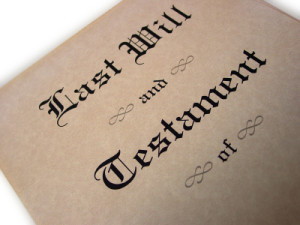WHY IS PROPERTY TITLE AS IMPORTANT AS YOUR WILL OR LIVING TRUST?
When you die, the way in which your beneficiaries are determined depends on whether the property is titled or not.
Property with a title includes real estate, vehicles, boats, airplanes, bank accounts, savings bonds, stock certificates, life insurance policies and retirement accounts. If you don’t have a will or a trust, state intestate laws will determine who inherits property with a title.
Property without a title includes jewelry, art, antiques, and your digital assets. Unlike titled property, there are no default laws that determine who inherits property without a title.
- How are beneficiaries determined for property with a title?
- How are beneficiaries determined for property without a title?
Title is the manner in which both real and personal property is owned. Title may be proven by certificate, deed, bill of sale, contract, signature cards or other documents. The title documents may also designate a beneficiary. The title may state that an individual owns the property or multiple people own the property, i.e., joint tenants with rights of survivorship, or a trust owns the property.
Title can indicate whether the property is owned by an individual, by joint tenants, or a trustee.
It turns out that a title is more than just a piece of paper conveying ownership of a house, a car or a safe deposit box. Property title determines whether contract law governs the inheritance of the property or whether the wishes written in your will or trust govern the inheritance of the property.
Q. What are asset buckets and why do they matter?
A. When you die, someone will make an inventory of your estate. Think of your titled assets as going into three buckets: the probate bucket, the trust bucket and the automatic inheritance bucket. Which bucket the asset belongs in is determined by the way the property is titled.
Probate assets:
- Property owned by an individual
- Property owned as joint tenants with rights of survivorship, no living joint tenant
- Property where “Estate” is the named beneficiary or becomes the default beneficiary because the designated beneficiary died before the owner.
- The decedent’s share of property owned as tenants in common
Trust assets
- Property owned by a trustee
Automatic inheritance assets:
- Joint tenants with right of survivorship, a living joint tenant
- Community property with right of survivorship, a living joint tenant
- Property owned by an individual, or more than one person with a designated living beneficiary: life insurance policies, retirement account, pay on death bank accounts, transfer on death brokerage account, tranfer on death real estate deeds and transfer on death vehicle registration forms.
Q. Why do the buckets matter?
A. Once you know in what bucket the asset belongs, you will know who has the authority to empty the bucket.
Probate assets
Probate assets will be managed by the executor named in your will or by a personal representative appointed by the court if you do not have a will.
- Instructions in your will generally determine the beneficiary of your probate assets. If you do not have a will, state intestate secession rules determine the beneficiary.
- The executor or personal representative must determine what type of probate procedures are required to get authority (Letters of Affidavits) to manage the property.
Trust assets
- Trust assets will be managed by the successor trustee named in your trust.
- Instructions in your trust determine who are the beneficiaries of assets owned by your trust.
- The trust gives the successor trustee the legal authority to manage trust assets.
Automatic inheritance rights
Assets with automatic inheritance rights will be managed by the beneficiaries who automatically inherit the property.
- The law automatically determines the beneficiaries and overrides any instructions contained in a will or trust.
- A beneficiary has the authority to immediately claim their property with a certified death certificate and an affidavit or other claim form.
Untitled property
Even if you die without a will or a living trust, default state and federal laws will determine who inherits your titled property. Untitled property is different. There are no default laws determining who inherits your untitled property.
Q. What happens to your untitled personal property?
A. For many families, deciding who will inherit personal property is a big emotional event. Memories are sometimes more important than money. Your heirs are more likely to argue about personal property than anything else you own. There are several ways to deal with personal property and keep the peace at the same time. First, you should decide who is going to get what. Just your children? Other close relatives? Friends? You can decide. It’s your property, after all.
If you have a will or trust, specify in your will or trust who gets what. Your will or trust should also reference a specific Personal Property Attachment which lists who gets what.
Q. What is the best way to document your personal property and how you want it divided when you die?
A. Many products are available to help make a list of your personal property. The information can be completed by hand or stored in electronic records. Most products provide a way to inventory your house room to room and list and photograph personal property in each room.
- You can provide detailed information such as what it is, where you got it, if it’s an heirloom, etc. You can also include who you would like to receive it when you die.
- You can also use a digital recorder and make an audio tour of your house, recording items as you walk through each room
The important thing is that you document what you have, where it is and who gets it when you die. Be aware that simply making a list of your personal property may not be deemed valid and legally enforceable upon your death unless the list is referenced within your will or trust.
Q. What happens to your e-mail, blog or other business processes stored on hosted site on the Internet??
A. If you own a small business and your accounting or sales systems are managed on hosted web sites (for instance, Yahoo, Google, Ebay, etc.), it is critical someone knows how to access these accounts. Digital assets are considered personal property. There are no default laws determining who has rights to access thee assets or state statutes an Internet Service Provider (ISP) must follow when someone dies.
The result: Each ISP has set their own policies on whether they will provide passwords or user IDS to your spouse, executor or trustee when you die. Some ISPs may not.
If you work in a small business, your chief executive officer or chief financial officer may not be able to access company files without your passwords.
When you set up accounts on hosted services, ask what their policy is regarding user IDs and passwords when someone dies. Plan accordingly. Create and maintain a list of URLs, user IDs and passwords for important data.
Q. How will your employees, executor or spouse gain access to data files stored on your personal computer.
A. You own the data on the PC. You have the right to leave instructions on who inherits any intellectual property stored on the PC. If you have data you don’t want someone to see after you die, be sure to delete it on a scheduled basis. Don’t forget to leave any user IDS or passwords someone will need to log onto your computer.


